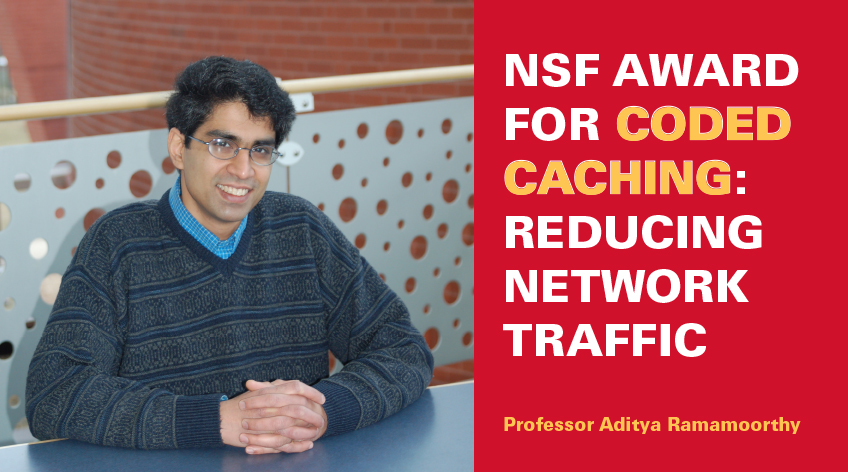Most people have watched videos, TV shows and movies by streaming them on YouTube or Netflix. If you’ve streamed video content, then you know how frustrating it can be to wait for the video to load. One researcher at Iowa State University is hoping to improve those network delays.
Iowa State Professor of Electrical and Computer Engineering Aditya Ramamoorthy has received an award from the National Science Foundation (NSF) for his project entitled “Towards Practical Coded Caching.” The grant totals $449,996 over the next three years.
According to the project’s abstract, this research will “investigate practical issues in the deployment of coded caching, which is a technique that promises huge reductions in caching network traffic… This will pave the way for the adoption of coded caching in large scale video and audio streaming websites, thus improving the efficiency of the national network infrastructure.”
Caching is a technology used by almost everyone with computer access on a regular basis. For example, when you view a video on YouTube, you are almost surely accessing a cache that is much closer to you than connecting to the original server where the content was uploaded. Coded caching improves the efficiency of traditional caching methods by transmitting fewer amounts of data, which leads to faster transmission.
“One commonly used technique to facilitate content delivery is caching,” Ramamoorthy said. “The main idea in conventional content caching is to store relatively popular content in local memory, either on the desired device or on a device at the edge of the network. Upon request, the system first searches the cache for the required file. If a match is found, the request is served from the cache itself, and the traffic from the server to the cache is reduced. This reduces the overall network congestion.”
Ramamoorthy’s research will attempt to minimize per-user delays, in instances such as video-on-demand playback.
“Content distribution over the internet is an important problem and is the core business of several enterprises, such as YouTube, Netflix, Hulu, etcetera,” Ramamoorthy said. “The operation of such large-scale systems presents several challenges, including — but not limited to — storage of the data, ensuring reliable availability and efficient content delivery… There are practical issues of critical importance that need to be examined in depth before [coded caching] can be deployed in practice. The funded project will address these issues.”
The general public could see improvements in content viewing, thanks to this project.
“If successful, one could potentially think about viewing videos on smartphones at five to ten times the current resolutions, or equivalently, your data plan could go for much longer,” Ramamoorthy said, meaning a video could be viewed using less cellular data than what the content currently requires, or the viewer could choose to play the video at a much higher resolution than is available now.
Ramamoorthy plans to use this NSF funding to support graduate students who are working on his project, as well as to pay for travel to conferences and workshops for publicizing their results. He thanks his students for their assistance in winning the award.
“I have two students who have worked on these topics; they have played a key role in generating the initial results that helped to make the proposal really strong,” Ramamoorthy said. “Hooshang Ghasemi is my Ph.D. student who has done some very interesting work on understanding the fundamental limits of caching systems… Li Tang is another student who has done some outstanding work on the design of practical coded caching systems where the number of parts that each file need to be subdivided in is manageable.”
Their hard work has paid off, and the proposal was viewed favorably by the NSF panel.
“I have been working on this topic for about three years or so, and I needed the grant to further my research efforts,” Ramamoorthy said. “I was quite happy, as this will keep my research on this topic going for a while without any foreseeable interruptions.”
